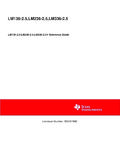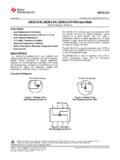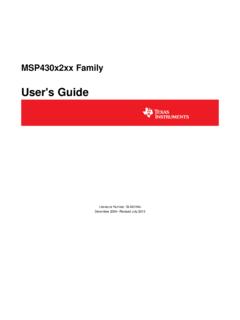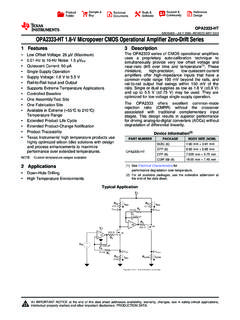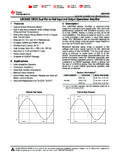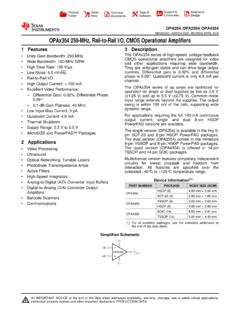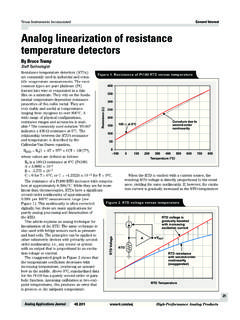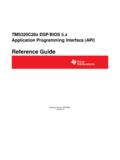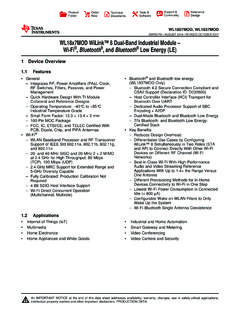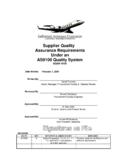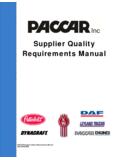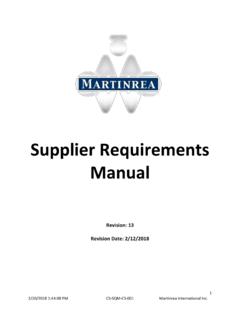Transcription of Texas Instruments General Quality Guidelines (Rev. J)
1 Page 2 of 10 Index Page 1 Scope 3 2 Quality management System 3 3 management Responsibility 3 4 Audits 3 5 Purchasing and Supplier management 3 6 External Calibration Laboratories 4 7 Product Development 4 8 Risk management 4 9 Qualification / Reliability 4 10 Process Monitoring 4 11 Measurement System Analysis (MSA) 5 12 Production Part Approval Process (PPAP) 5 13 Electrostatic Discharge (ESD) 5 14 Software Quality Assurance 5 15 Continual Improvement 5 16 Nonconforming Products 6 17 Corrective and Preventive Actions 6 18 Customer Returns 6 19 Change management 6 20 Product Withdrawal / Discontinuance 7 21 Business Continuity Program 7 22 Identification and Traceability 7 23 Packing 7 24 Shelf Life 7 25 Lot Combination 8 26 Customer Labeling 8 27 Record Retention 8 28 Restricted Chemicals and Materials 8 29 Conflict Minerals 9 30 Environmental Safety and Health 9 31 Electronic Industry Citizenship Coalition
2 9 32 Abbreviations 9 33 Record of Changes 10 Important Notice 11 Page 3 of 10 1 SCOPE The General Quality Guidelines (GQG) apply to the provision of Quality assurance with respect to materials, products, services, manufacturing processes, tests, controls, handling, storage and transport measures as well as the management processes used and/or applied by TI in order to ensure compliance of TI components with the published and/or specifically agreed specifications. TI will endeavor to comply fully with these Guidelines ; however, nothing in this document shall be construed to create, expand or in any way alter remedies, if any, as defined in TI's terms of sale. TI works hard to follow these Quality practices and seeks to provide customers with the most accurate and up to date information available about its General Quality practices.
3 Although the information provided herein is true and accurate at the time of this writing, TI may occasionally make changes or updates. 2 Quality management SYSTEM TI s Quality Policy Manual has been written to meet the re quir ements of our customers as well as applicable Intern ational and Natio nal St andards such as Internatio nal St andardiz ation Organiz ation (ISO) 9001 and IATF16949. It is supported by documented pro cedures, work in structions, and pro cess flows that define specific activ iti es needed to implement the Quality management system and the Quality policy. This documentation describes the in teraction between the pro cesses of TI s Quality management system. 3 management RESPONSIBILITY Top management is commit ted to the implementation and continual impro vement of TI Quality systems as a critical method for product re alization and customer support.
4 Top management and other management as appropriate re gularly review the effectiveness and effi ciency of the Quality system, and make the necessary adjustments to meet pla nned objectives and customer re quirements. 4 AUDITS Periodic in ternal audits are perf ormed to ensure compliance to stated re quirements, the effective imple mentation and operation of the Quality management system, and the id entif ication of opportunities for continual improvement. Audits are conducted at planned intervals and are perf ormed by qualified internal auditors independent of the are a bein g assessed. A pro cess is in place to ensure qualified internal assessors are used. Results of audits are documented; corrective actions are executed and evaluated for effectiveness.
5 Review of audit results are part of the management review process. TI s suppli er Quality system assessment is addre ssed in the Purchasing and Supplier management section. Occasionally , customers may ask to verify product at one of TI s supplier sites. TI manages these re quests on a case-by-case basis and coordin ates with the supplier, as appropriate. Customer audits will be conducted during regular busin ess hours and any re quests for audits should be re cei ved at le ast thirty days prior with agendas pro vided at least two weeks prior to the audit. Customer audits are restricted to TI s Quality management System and any mutually agreed upon customer specific requirements. Any additional audit topics should be agreed upon in advance as part of the audit planning process.
6 5 PURCHASING AND SUPPLIER management The Quality of TI products is dependent on the Quality of purc hased materials and serv ices. TI requires suppliers of critical products and services to develop, implement, and improve a Quality management system certified to ISO 9001 and other applicable Quality management system standards. The purc hase pro cess is documented and structure d to meet the following requirements: Ensure that purchasin g documents clearly describe the product and serv ic es ord ered Ensure that purchased products and servic es conform to purchase re quir ements Communicate to suppliers the appro priate product, Quality , and deli very re quirements Ensure that purchased materials and servic es meet government, safety, and environmental regulations Ensure that finished product, dir ect materials, and packin g materials meet the pro visions of re gula tory and customer requirements All TI groups/organizations utilizing purc hased materi als and serv ic es will work with the establi shed supplier management Page 4 of 10 organiz ations, as applicable.
7 To ensure that the supplier management pro cess in place is structured to cover the following: Identify and select suppliers with the capabil ity to meet TI needs Establi sh criteria for sele ction, evaluatio n, qualification, and certification of suppliers Perf orm supplier Quality management system develo pment Ensure continuity of supply Ensure that critical materials and servic es are purchased only from appro ved sourc es Monit or and provid e feedback on supplier perf ormance Monit or product Quality and deli very perf ormance (including use of pre miu m freight, as applicable ) 6 EXTERNAL CALIBRATION LABORATORIES The Extern al Calibration Laboratori es that Texas Instruments chooses to use must be approved based on their accredit ation or their status as an Original Equipment Manufacture r.
8 When supporting IATF 16949 cert ifie d sit es, extern al calibration labs will be certified to ISO 17025 or natio nal equiv alent. 7 PRODUCT DEVELOPMENT All new product develo pment at TI follows a structure d new product develo pment pro cess such as Pr oduct Quality Planning, Advanced Product Quality Pla nning (APQP), and/or Pr oduct Realization as applicable. A phase review system for each group is defined in controll ed documented pro cedures. A formal project review and appro val, by responsib le management , is comple ted and documented at critical points in the develo pment process. The proces s is designed to manage organiz atio nal in terfaces , pro ject ri sks, schedule (including sample delivery, qualification, and PPAP documentation) and communication between groups in volved in the develo pment pro cess.
9 8 RISK management TI uses ri sk management as part of new product develo pment and manufacturi ng. For IATF 16949 requir ements, TI uses FMEA as the ri sk management methodology. Other ris k management consid erations in cludin g but not limited to functional safety and safety critical application may be utilized and will depend upon the specif ic TI component re quirements. Applicable manufacturi ng ri sk management summaries are available for review at TI facilities. 9 QUALIFICATION / RELIABILITY Quality and reliability are built into TI s culture, with the goal of providing customers high Quality products. TI s semiconductor technologies are developed with a minimum goal of fewer than 50 Failures in Time (FIT) at 100,000 Power-On-Hours at 105C junction temperature.
10 TI builds simulations, accelerated testing, and robustness evaluations into the product development process. During the product development process, TI carefully assesses silicon process reliability, package reliability, and silicon/package interaction. TI also evaluates manufacturability of the device to verify a robust silicon and assembly flow to enable continuity of supply to customers. Non-Automotive devices are qualified with industry standard test methodologies performed primarily to the intent of the Joint Electron Devices Engineering Council (JEDEC). Other standards (IPC/MIL/ANSI) may be used when appropriate. TI performs enhanced reliability testing for particular parts in accordance with the requirements of the Automotive Electronics Council (AEC)-Q100 or military standards that would be specific to the intended environmental conditions that are anticipated for field application of the device.
